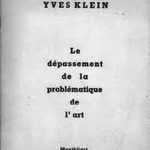Knowing looks
Reivew of Tom Holert, Knowledge Beside Itself
Tom Holert, Knowledge Beside Itself: Contemporary Art’s Epistemic Politics (Berlin: Sternberg Press, 2020). 278 pp., €22.00 pb., 978 3 94336 597 9 Tom Holert remarks near the beginning of Knowledge Beside Itself that art has traditionally been defined in contradistinction to knowledge, at least scientific or systematic knowledge. How then to understand the proliferation of […]





